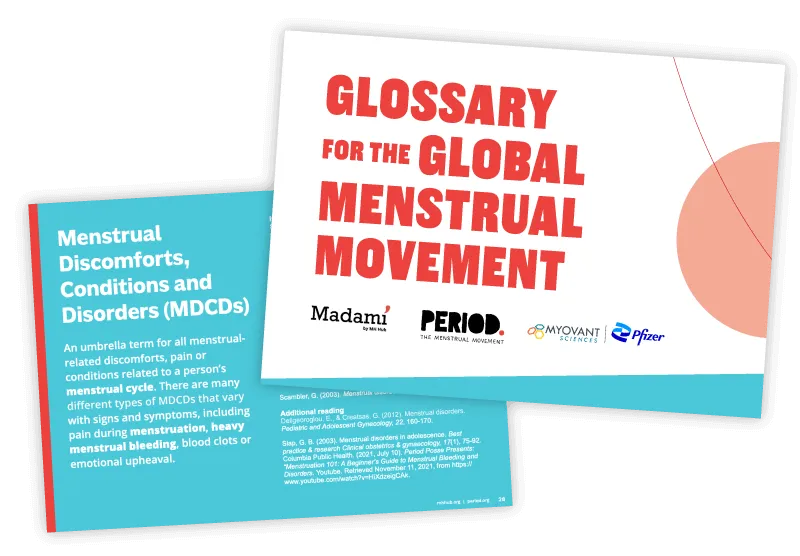Learn About Your Period Health

What is period health?
Let’s make sure we’re all on the same page - what exactly is a period?
A period, also known as menstruation, is the normal monthly bleeding from a woman’s vagina.1 A period occurs when the inner layer of the sheds; if there is no pregnancy, this typically happens every month or so in female bodies.2
Not every period is the same.1 Below are things you should pay attention to when monitoring your period health.3



The quality of your period can tell you a lot about your health. Periods that are heavy and painful, are long, or don’t come every month could be a sign of a health problem.3

Let’s talk about
periods
How we speak about our period matters. Choosing the right words can help to fight and change behavior. This glossary, created by PERIOD. and Madamí, with support from Sumitomo Pharma, can help you find the right words to describe your period.
See the full glossary from PERIOD.
Take charge of your health
There’s a lot of misunderstanding about what is a “normal” period. Period stigma, or taboo, from society can make it difficult to talk about your period and understand if you might need help.4 It is important to be able to recognize signs of a problem and talk openly about your period without feeling embarrassed.
Below are common things that women might think about their health.

My heavy, painful periods are normal.
Many women who experience heavy bleeding become so used to it that their struggles seem normal to them.6 While some discomfort during your period is normal, severe pain and heavy bleeding on a consistent basis is not.
If you find that your period pain is impacting your daily life or preventing you from doing the things you enjoy, it’s time to talk to your healthcare provider.
I don't need to talk about my menstrual health.

More than 3 out of 5 people (>60%) believe that period stigma, or taboo, exists in society.4 Because people don’t talk about periods often, many women aren’t even aware of health conditions, or that they might be at risk.6 This makes it difficult to recognize abnormal bleeding.
Your discomfort should not be dismissed; you deserve to know what’s really happening with your body and what might be causing it.
I have to handle my period on my own.

About 1 in 5 women (~20%) feel uncomfortable talking to their healthcare provider about their period.4 Some people may feel like they’re making a big deal out of nothing.6
Know that your concerns are valid, and you don’t have to deal with period problems on your own. If you feel unheard, feel empowered to seek out a healthcare provider who is ready to listen and help. It’s time to talk about uterine health and be honest about your experience.
1. You got your first period. Now what? PERIOD. Accessed March 2025. https://period.org/uploads/Digital-Color-First-Period-FAQs.pdf. 2. Global glossary for the global menstrual movement. PERIOD. Accessed March 2025.
